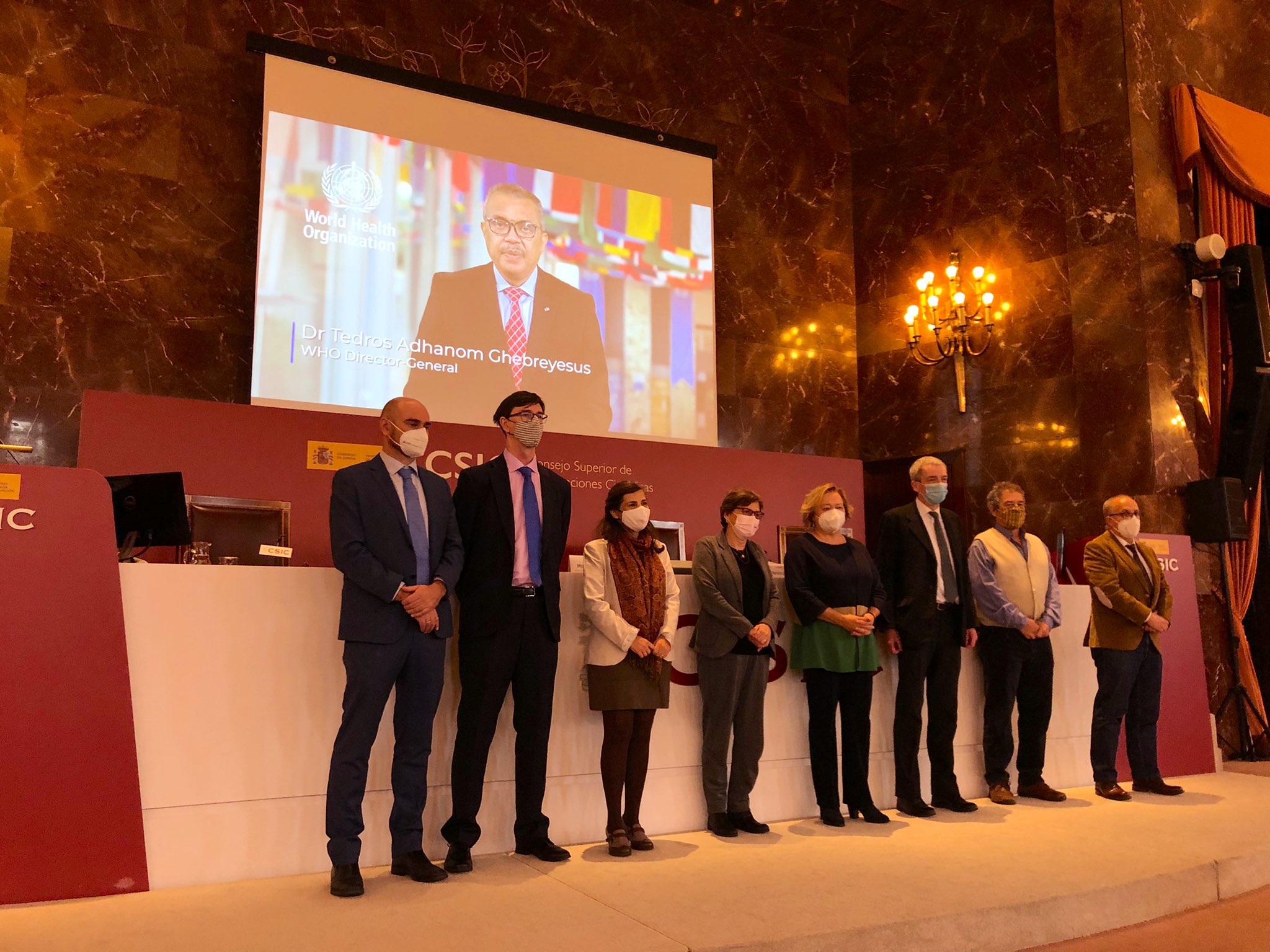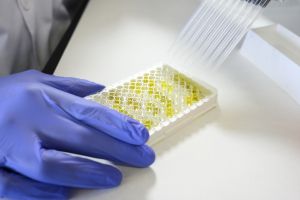El acuerdo se ha firmado hoy en un acto institucional en la sede central del CSIC, presidido por la ministra de Ciencia e Innovación, Diana Morant; la presidenta del CSIC, Rosa Menéndez; el director ejecutivo de MPP, Charles Gore; y la subdirectora general para el Acceso a Medicamentos, Vacunas y Productos Farmacéuticos de la OMS, Mariangela Simão. A través de un video, el director general de la OMS, Tedros Adhanom Ghebreyesus, agradeció la generosidad del CSIC al firmar este contrato.
La ministra de Ciencia e Innovación ha destacado que se trata de la primera cesión de una tecnología desarrollada por un organismo público que se une a esta iniciativa y ha subrayado que, “con acuerdos como el de hoy, estamos protegiendo vidas”. “La ciencia tiene una vocación universal, mejorar la vida de las personas, y ese es también un firme compromiso de nuestro gobierno: que la ciencia pública esté al servicio de todos y todas”, ha dicho.
El acto lo ha inaugurado la presidenta del CSIC, Rosa Menéndez, quien ha incidido en lo importante que es buscar soluciones para que las tecnologías relacionadas con la pandemia en particular, y la salud en general, lleguen a todos los países, incluyendo los más necesitados. “En este sentido, nos gustaría que esta actuación del CSIC, de implicarse en las iniciativas internacionales de MPP y la OMS, se convierta en un ejemplo y una referencia para otros organismos de investigación en el mundo”.
Charles Gore (MPP), director ejecutivo de MPP, ha manifestado que esta es la primera vez que un centro público de investigación pone una tecnología a disposición de esta iniciativa de la ONU, y la primera vez que MPP firma una licencia de diagnóstico.
“Este acuerdo constituye un hito en la carrera para prevenir, diagnosticar y tratar la covid-19 en países necesitados, y hay que felicitar al CSIC, como organismo público de investigación, por su compromiso con la solidaridad y por ofrecer acceso mundial a su tecnología y conocimientos”, ha declarado Mariangela Simão (OMS).
Este acuerdo supone la primera licencia mundial de acceso abierto para una herramienta sanitaria relacionada con la covid-19. La firma se enmarca en la iniciativa COVID-19 Technology Access Pool (C-TAP), creada por la OMS en mayo de 2020 para facilitar el acceso oportuno, igualitario y asequible a productos sanitarios de la covid-19 a través del impulso a su producción. C-TAP proporciona una ventana única mundial a las entidades que desarrollan tecnologías para hacer frente a la covid-19, como terapias, vacunas y sistemas de diagnóstico, con el objetivo de que compartan su propiedad intelectual (patentes), conocimiento y datos, con fabricantes de probada calidad mediante licencias transparentes, no-exclusivas y con voluntad de servir a la sanidad pública.

En la imagen (izda-drecha) Javier Maira, responsable del Área de Estrategia Comercial e Internacionalización del CSIC; Hugh Reyburn y Mar Valés-Goméz, investigadores del CNB-CSIC; Mariangela Simão, subdirectora general para el Acceso a Medicamentos, Vacunas y Productos Farmacéuticos de la OMS; Rosa Menéndez, presidenta del CSIC; Charles Gore, director ejecutivo de MPP; Jose Miguel Rodríguez Frade, investigador del CNB-CSIC y Mario Mellado, director del CNB-CSIC
Test con una fiabilidad cercana al 100%
Los test serológicos del CSIC salieron al mercado en España en el otoño de 2020, de manos de la empresa española Immunostep, y permiten detectar con una fiabilidad cercana al 100% si una persona posee anticuerpos contra el SARS-CoV-2, y si dichos anticuerpos provienen de la vacuna, o son consecuencia de que han estado en contacto con el virus. Ahora el CSIC da un paso más y, de la mano de la iniciativa de Naciones Unidas Medicine Patent Pool (MPP), se propone que sus test serológicos lleguen a los países en vías de desarrollo.
Para ello, el CSIC, la OMS y la MPP han trabajado durante varios meses para buscar la fórmula más adecuada. El CSIC y la MPP han firmado un acuerdo por el que esta última podrá sublicenciar los derechos de explotación de los test serológicos del CSIC a empresas en países que necesiten esta tecnología. “Lo novedoso del acuerdo es que el CSIC no cobrará regalías por la explotación de su tecnología siempre que se fabrique para países incluidos en la lista Low and medium income countries - países con ingresos bajos o medios -, o en dichos países”, ha declarado Javier Maira, responsable del Área de Estrategia Comercial e Internacionalización del CSIC.
El acuerdo también contempla que las empresas que comercialicen estos test tendrán que ajustar el precio de los mismos para que sean asequibles en el país que los comercializa. De esta manera, las tres organizaciones confían en que los test lleguen a los países con menores ingresos, y de forma asequible para sus ciudadanos y sistemas de salud. “Es la primera vez que se utiliza esta fórmula para que una tecnología del CSIC llegue a los países que la necesitan, y desde luego que si se tiene éxito el CSIC pondrá a disposición de la MPP otras tecnologías”, ha declarado Ana Castro, la vicepresidenta adjunta de Transferencia del Conocimiento del CSIC.






